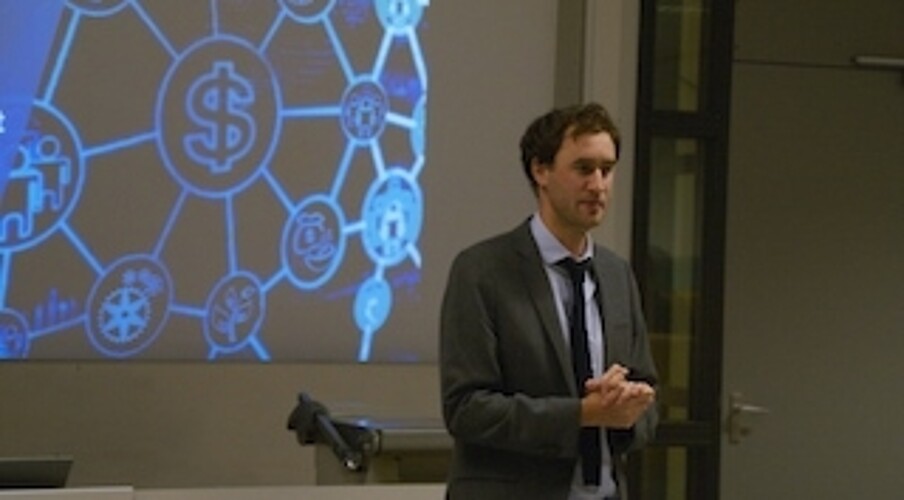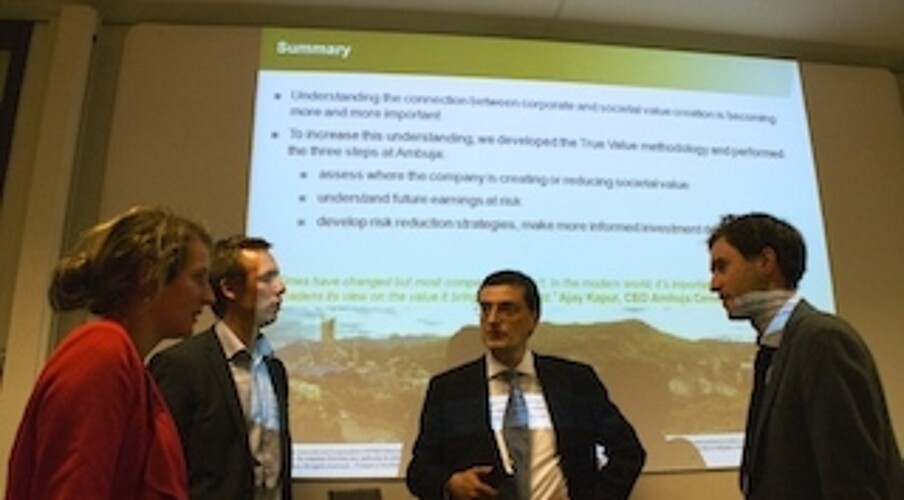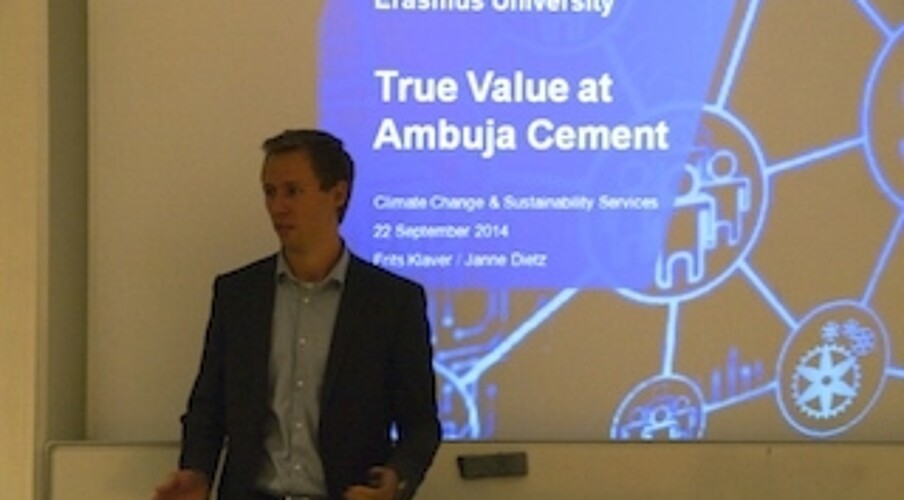Reported and written by Joey Johannsen, Sustainability Coordinator SRSM
“Externalities have historically been largely excluded from the measurement of corporate value. But this ‘disconnect’ between corporate and societal value is disappearing”, according to the 3 September 2014 global report - A New Vision of Value, Connecting corporate and societal value creation, by KPMG, a global network of professional firms providing Audit, Tax and Advisory services.
On 22 September, KPMG Netherlands representatives Frits Klaver and Janne Dietz were invited to present the new report which includes KPMG’s True Value methodology. Throughout the presentation, the case of Ambuja Cement[1] was used. Ambuja and KPMG developed the True Value methodology which eventually led to the publication of world’s first Social and Environmental Profit and Loss statement.
KPMG’s report forms a case study into cutting-edge research and methodology, and it was explored by students studying sustainability leadership and planetary boundaries as part of RSM’s MSc Global Business and Stakeholder Management programme, and those studying accounting for decision-making in the MScBA Accounting & Financial Management programme.
A quote by Peter Bakker, a graduate of Erasmus University Rotterdam and current President of the World Business Council for Sustainable Development (WBCSD) opened the seminar. The quote simply said: "Accountants will save the world”. It set the tone for the two-part seminar with the objective of introducing students to the basics of sustainability accounting, the methods and an overview of integrated reporting in addition to an examination of the Holcim/Ambuja case study. Leading the session were Dr Steve Kennedy and Dr Paolo Perego from RSM.
Widening the concept of cost
Frits Klaver, Sustainability Advisor with KPMG Advisory N.V. was introduced as being ‘in the social and environmental profit and loss business’. Frits cemented his position by saying, "We give companies advice on improving their Sustainability performance, strategy and reporting."
Klaver and the students engaged with ideas, concepts and questions. Topics included true costs, raw materials, assembly, use, end of life, integrated reporting, and considerations of the research done by Gray in 1993 that asked “who bears the true cost of products”? The group concluded that everyone will be affected in the future: both society and nature, and that traditional practices do not account for the bigger picture of cost. Key research provides the connection between performance and environment. It was agreed that externalities (known as third party or spill-over effects arising from the production and/or consumption of goods and services for which no appropriate compensation is paid) are not generally being accounted for, and therefore true costs are not reflected in consumer pricing.
Focus on all sectors to see where to improve
KPMG’s global report helps readers to see how new regulations, growing stakeholder influence and changing market dynamics are driving the internalisation of business externalities at an increasing rate, and how companies can protect and create both corporate and societal value in the age of internalisation using the KPMG True Value methodology. The report formed the backdrop to the lecture, and was illustrated using the Holcim / Ambuja case study.
Key differences between public and private goods were listed in an Excludability Chart, and introduced to students during the seminar. Students considered categories of goods in terms of ownership and rivalry in their consumption. A review of the Tragedy of Commons introduced in 1968 by Garrett Hardin in the Science journal illustrated the dilemma that self-interest is always a problem. “The theory states that people will overgraze areas since fields are open to all – but is this really always the case?” asked RSM’s Dr Steve Kennedy.
Integrated reporting should steer business activity
“I believe integrated reporting should steer business activity,” said Dr Kennedy. “Students are entering an emerging field, an area of great opportunity where companies are looking for researchers to help them break through the challenges. Integrated reporting agencies such as Global Reporting Initiative (GRI), Sustainability Accounting Standards Board (SASB) the International Integrated Reporting Framework (IR) are on the scene today, but the methodology is still too slow to deal with the complex sub-categories that connect in accountant terms ‘inputs to outputs’. The case studies of Puma and Holcim show how to implement organisational change and tell the stories of value creation, but have also created peer pressure within the industry.”
Accounting and sustainability departments working closely together
Dr Kennedy explained it was his decision to invite students from the MSc Finance and Investment programme accounting to join students from the MSc Global Business and Stakeholder Management programme. “Accounting departments and sustainability departments will need to work closely together to produce successful integrated reporting and thinking within companies,” he said. Students intent on this career path need to appreciate the issues and benefits to understanding a company's true value. “Teaching them together will also hopefully facilitate this interaction in the future.”
“I feel that it is important that students entering these firms from different backgrounds already understand and even lead these initiatives," said Dr Kennedy. Groups such as The Economics of Ecosystems & Biodiversity (TEEB) and True Price™ in Amsterdam are recognised sources offering companies established pricing numbers to use in this methodology.
Visionary leadership
Frits Klaver said the managing director of Ambuja (Onne van der Weijde) engaged KPMG on demonstrating the business case on the ground in India. Mr. van der Weijde and his team were instrumental in co-developing the True Methodology and providing leadership support throughout the project.
The result was a comprehensive overview of Ambuja’s True Value and helped Ambuja identify a number of financially attractive projects that would benefit local communities, society and the environment, and boost future profitability. Companies around the world are anxious to gain the lessons learned. Frits believes we need more visionary leaders like Onne Van Der Weijde, (BSc Economics and Accounting, Erasmus University) who are open for innovative thinking in the area of Sustainability and reporting in order to make the world a better place.
Take-Away Message
Janne Dietz, KPMG consultant drove home the main message when she said: “If more companies want to report their true value, a standardized approach will need to be established.” Ambuja is the first company that has reported its True Value and we expect more companies will follow. A new generation of business professionals is driving the revolution.
Future Impact: From floor level to corporate boardrooms.
When asked what impact this global proposition has, Dr Kennedy said: "KPMG's work on True Value with Holcim is really cutting-edge, and is creating waves across industry sectors. It was fantastic that they could present in class today; to teach something so fresh off the presses to our master students." When asked what he envisioned for the future of this topic in management education, Dr Kennedy said that true value should be taught at every business school across the world. KPMG's work with Holcim is at the forefront of the field and demands the attention of students aiming to enter the corporate world.
Dr Paolo Perego summarised his perspectives on the topic. “The social and environmental profit and loss set up in Holcim is a timely and well thought through attempt to incorporate externalities in a firm's accounting system. It shows how measurement of financials alone is incomplete without backing up a firm's operations with the knowledge of non-financial drivers and impacts across the value chain.” He applauded KPMG’s work. “The methodology developed by KPMG provides an example that is hoped to be followed by many more firms and industries. It also shows interesting career opportunities for students that want to challenge traditional disciplinary boundaries and functional silos; to spread sustainability and integrated thinking from floor-level to corporate board rooms.”
[1] Ambuja (Ambuja Cement Ltd.) is a major cement producing company in India and is a subsidiary of global cement producer Holcim. Holcim is one of the world's leading suppliers of cement and aggregates, employing some 71,000 people, with production sites in around 70 countries.



